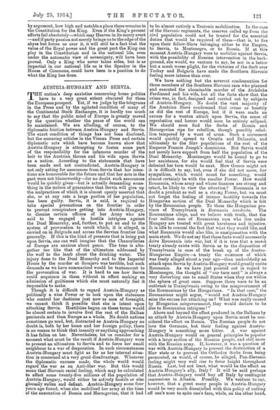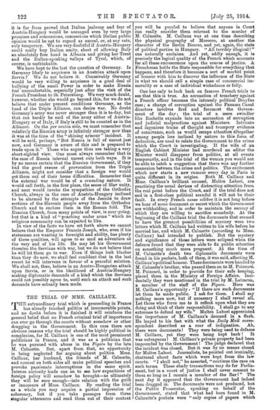AUSTRIA-HUNGARY AND SERVIA. T HE nation's deep anxieties concerning home politics
have to a very great extent obscured for them the European prospect. Yet, if we judge by the telegrams in the Press and by the agitated condition of many of the Continental Stock Exchanges, it is hardly too much to say that the public mind of Europe is greatly moved by the question whether the peace of the world can be maintained. We are alluding, of course, to the diplomatic friction between Austria-Hungary and Servia. The exact condition of things has not been disclosed, but the menacing articles in the Vienna Press and certain diplomatic acts which have become known show that Austria-Hungary is attempting to fasten some part of the responsibility for the infamous murder of the heir to the Austrian throne and his wife upon Servia as a nation. According to the statements that have been made and not contradicted, Austria-Hungary is not only asking for assurances from Servia that her inten- tions are honourable for the future and that her acts in the past were not blameworthy—for no doubt such assurances would be quickly given—but is actually demanding some- thing in the nature of guarantees that Servia will give up the malpractices of which it is almost openly asserted that she, or at any rate a large portion of her population, has been guilty. Servia, it is said, is required to take special precautions on the frontier in order to prevent conspirators getting into Austria-Hungary, to dismiss certain officers of her Army who are said to be engaged in hostile intrigues against the Dual Monarchy, and, further, to put an end to the system of provocation to revolt which, it is alleged, is carried on in Belgrade and across the Servian frontier line generally. If this is the kind of pressure that is being put upon Servia, one can well imagine that the Chancelleries of Europe are anxious about peace. The tone is alto- gether too like that of the ultimatum addressed by the wolf to the lamb about the drinking water. The injury done to the Dual Monarchy and to the Imperial House by the murder at Serajevo was terrible, but such demands as we have summarized would be tantamount to the provocation of war. It is hard to see how Servia could acquiesce in them without in effect making an admission of guiltiness which she must naturally feel it impossible to make.
Though it is difficult to regard Austria-Hungary as politically a wise Power or to look upon the statesmen who control her destinies just now as men of foresight, we cannot think it possible that she is intent upon attacking Servia. Hostilities begun on these terms would be almost certain to involve first the rest of the Balkan peninsula and then Europe as a whole. No doubt nations sometimes go mad, but, distracted as Austria-Hungary no doubt is, both by her home and her foreign policy, there is no reason to think that insanity or anything approaching it has fallen on her. Nevertheless, let us consider for a moment what must be the result if Austria-Hungary were to present an ultimatum to Servia and to force her small neighbour to a war of desperation. In such circumstances Austria-Hungary must fight as far as her internal situa- tion is concerned at a very great disadvantage. Whatever the diplomatic excuses made, the whole world would regard the war as an Anti-Slav war. But this would mean that Slavonic racial feeling, which may be calculated to affect some twenty-five millions of the population of Austria-Hungary, would either be actively hostile or else gloomily sullen and defiant. Austria-Hungary some four years ago found, when she mobilized her army at the time of the annexation of Bosnia and Herzegovina, that it had to be almost entirely a Teutonic mobilization. In the case of the Slavonic regiments, the reserves called up from the civil population could not be trusted for the essential duties that would be required of them—that is, to fire upon their fellow-Slays belonging either to the Empire, to Servia, to Montenegro, or to Russia. If at this moment Austria-Hungary were to mobilize against Servia, with the possibility of Russian intervention in the back- ground, she would, we venture to say, be not in a better but a much worse plight, for the victories of the Serb over Turkey and Bulgaria have made the Southern Slavonic feeling more intense than ever.
We have nothing but the severest condemnation for those members of the Southern Slavonic race who planned and executed the abominable murder of the Archduke Ferdinand and his wife, but all the facts show that the crime was, in fact, designed and carried out by subjects of Austria-Hungary. No doubt the vast majority of the Austrian Slays condemned that crime as heartily as did the rest of Europe, but if it were made an excuse for a wanton attack upon Servia, the sense of reprobation and horror would soon be entirely eclipsed. We should soon find the Serbs of Bosnia and Herzegovina ripe for rebellion, though possibly rebel- lion tempered by a want of arms. Such a movement would quickly spread to Croatia and Dalmatia, and ultimately to the Slav populations of the rest of the Emperor Francis Joseph's dominions. But Servia would not merely have support from half the population of the Dual Monarchy. Montenegro would be bound to go to her assistance, for she would feel that if Servia were defeated her turn would be next. How Greece might act it is difficult to say, but, even if she did not move, her sympathies, which would count for something, would almost certainly be with the smaller Power. How would Roumania, whose army and whose finances are strong and intact, be likely to view the situation ? Roumania is no doubt a prudent as well as a strong Power, but we must not forget the feeling of intense hostility towards the Hungarian section of the Dual Monarchy which is felt by the Roumanian people. To them the Hungarian pro- vince of Transylvania is .Roumania irredenta. The Roumanians allege, and we believe with truth, that the four million men of Roumanian race who live under Hungary are treated with great harshness and injustice. It is idle to conceal the fact that what they would like, and what Roumania would also like, is amalgamation with the main stock. We do not say that these facts would necessarily drive Roumania into war, but if it is true that a, secret treaty already exists with Servia as to the disposition of Transylvania in case of the break up of the Austro- Hungarian Empire—a treaty the existence of which was freely alleged about a year ago—then undoubtedly an attack upon Servia by Austria-Hungary would greatly excite Roumania. As we have just pointed out in regard to Montenegro, the thought of "our turn next" is always a very disturbing one to small States when they are within the sphere of great ones. Suppose there were to be an outbreak in Transylvania owing to the misgovernment of the Roumanians by the Hungarians. "In that case," the Roumanians might argue, 'would not Austria-Hungary seize the excuse for attacking us ? What was really caused by Hungarian misgovernment, they would declare to be due to Roumanian intrigues ! "
Above and beyond the effect produced in the Balkans by an attack by Austria-Hungary upon Servia must be con- sidered the effect on Russia. The Russian people do not love the Germans, but their feeling against Austria- Hungary is something more bitter. A war against Austria-Hungary would on general principles be popular with a large section of the Russian people, and still more with the Russian army. If, however, it was a question of war with Austria-Hungary to prevent the destruction of a Slav state or to prevent the Orthodox Serbs from being persecuted, as would, of course, be alleged, Pan-Slavonic feeling might very well rise to fever height throughout Russia. Last, but not least, what would be the effect on Austria-Hungary's ally, Italy ? It will be said perhaps that Austria-Hungary could buy off Italy by contingent concessions in Albania. Possibly. We venture to say, however, that a great many people in Austria-Hungary would be very much dissatisfied with this policy of cutting off one's nose to spite one's face, while, on the other hand, it is far from proved that Italian jealousy and fear of Austria-Hungary would be assuaged even by very large promises and concessions, concessions which Italian public opinion would be apt to regard as unreal, or, at any rate, only temporary. We are very doubtful if Austria-Hungary could really buy Italian amity, short of allowing Italy an absolutely free hand in Albania and giving her Trent and the Italian-speaking valleys of Tyro], which, of course, is unthinkable.
We have kept to the last the question of Germany. Is Germany likely to acquiesce in an Austrian attack upon Servia ? We do not believe it. Conceivably Germany would be very willing to acquiesce in a good deal of bullying of the small Power in order to make Russia feel uncomfortable, especially just after the visit of the French President to St. Petersburg. We very much doubt, however, whether she would go beyond this, for we do not believe that under present conditions Germany, as the Lead of the Triple Alliance, can desire war. No doubt Germany's army was never stronger than it is to-day, but that can hardly be said of the army either of Austria- Hungary or of Italy, if Italy is still to be counted as in the Alliance. On the per contra side, we must remember that relatively the Russian army is infinitely stronger now than it was at the time of the "shining armour" incident. It will be said, perhaps, "But Russia is full of unrest just now, and Germany is aware of this and is prepared to trade upon it." Those who argue thus are taking a very short-sighted view. One must always remember that in the case of Russia internal unrest cuts both ways. It is by no means certain that the Russian Government, if they had the good excuse of provocation from the Triple Alliance, might not consider that a foreign war would get them out of their home difficulties. Remember that the external war would be of a crusading nature. It would call forth, in the first place, the sense of Slav unity, and next would invoke the sympathies of the Orthodox Church, always in the case of Austria-Hungary inclined to be alarmed by the attempts of the Jesuits to draw sections of the Slavonic people away from the Orthodox Church and to enclose them in the Roman fold. The Russian Church, from many points of view, is easy-going, but that is a kind of "poaching under arms" which no religious community can be expected to like.
In view of the facts we have set forth above we cannot believe that the Emperor Francis Joseph, who, even if his statesmen are wanting in foresight and ability, has plenty of these qualities, will agree to so mad an adventure at the very end of his life. He may let his Government threaten the Servians with war, but we do not believe that he will let them go to war. Even if things look blacker than they do now, we shall feel confident that in the last resort he will intervene in favour of a peaceful solution. We shall not, then, believe in an Austro-Hungarian attack upon Servia, or in the likelihood of Austria-Hungary making diplomatic demands of a kind which the Servians could not possibly agree to, until such an attack and such demands have actually been made.







































 Previous page
Previous page